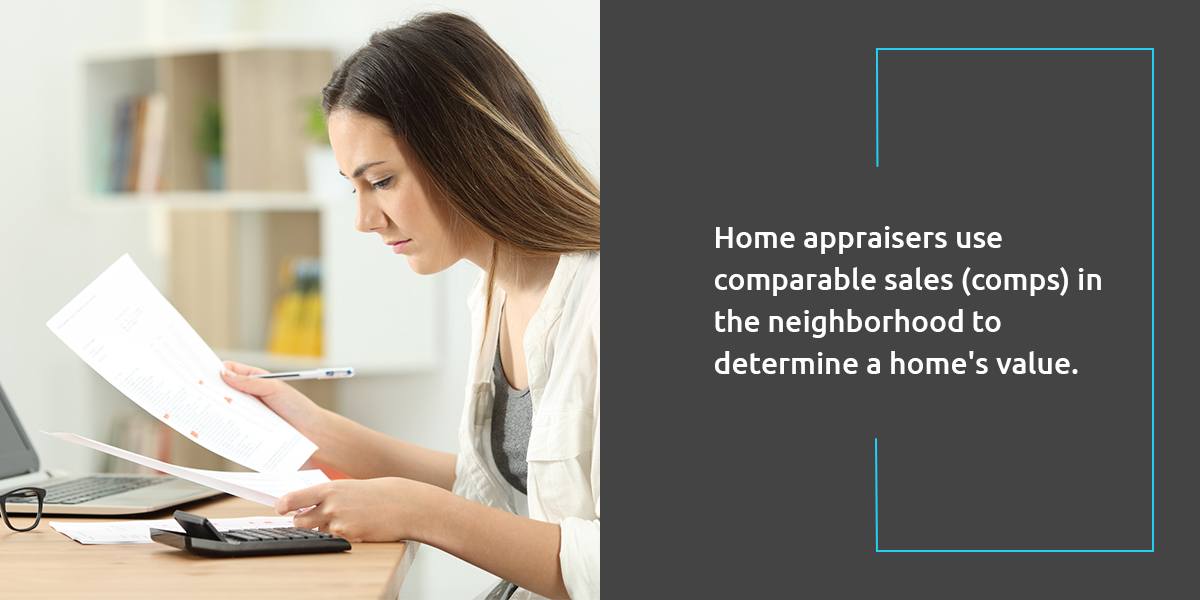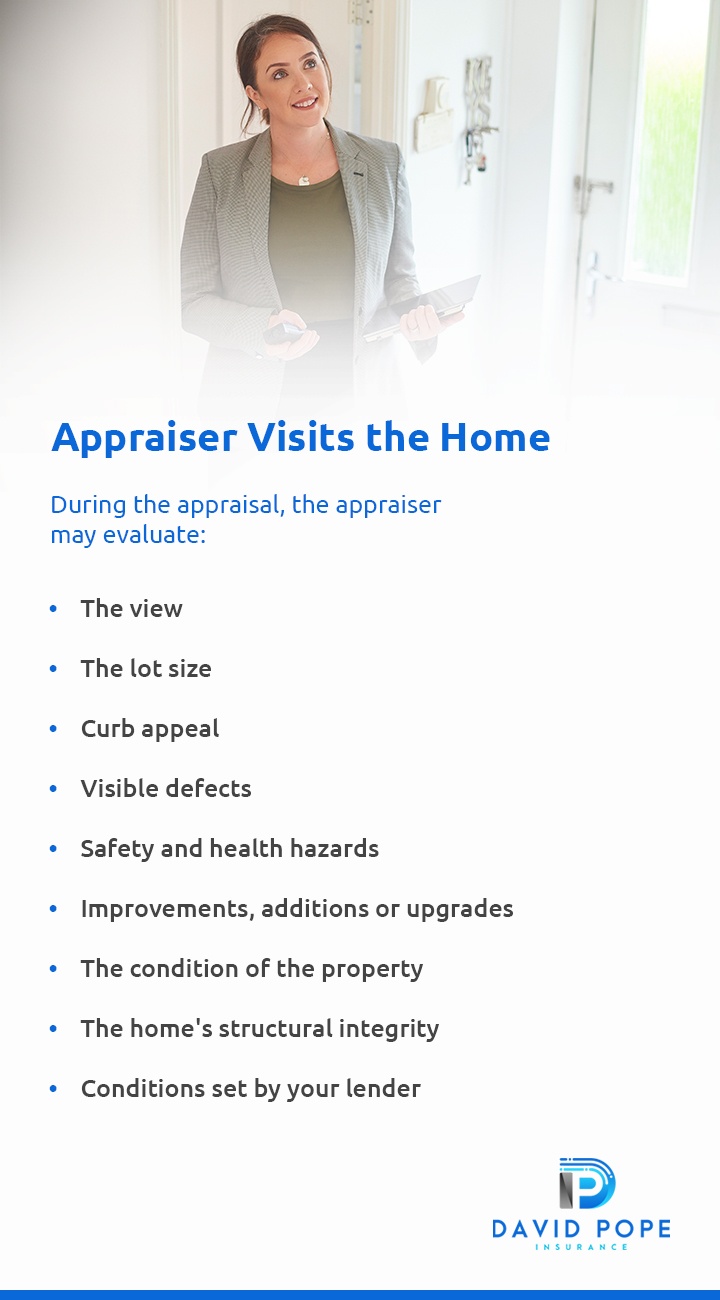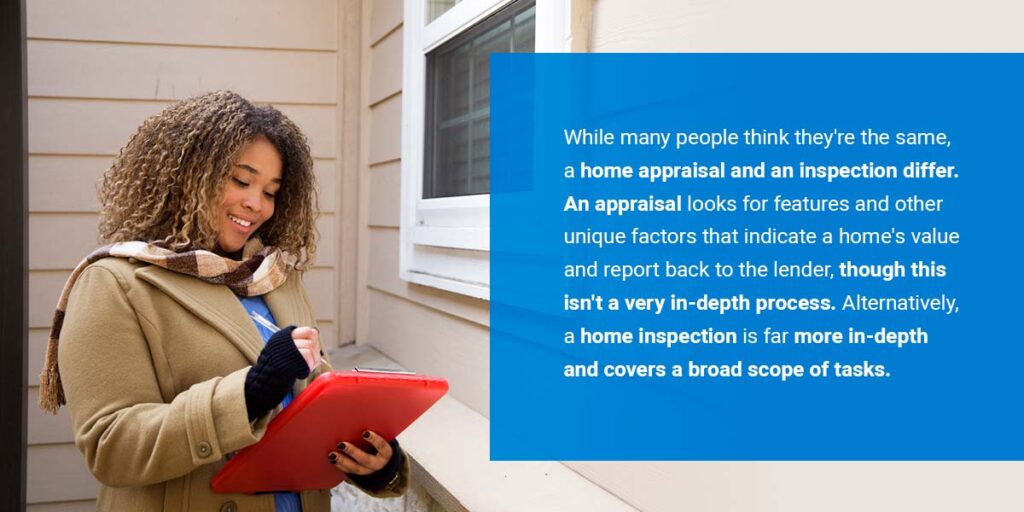When buying a home, an appraisal will help ensure you purchase your dream home at the correct value. Home appraisals also impact the selling cost, and thus, your mortgage amount. Once you have an estimated home value, you may pay more or less for the property, depending on what the appraiser concludes.
What can you expect regarding the costs and timeline of a home appraisal? This guide will help you understand how the home appraisal process works so you can navigate this part of homebuying with confidence.
Jump To:

A home appraisal is used to estimate the fair market value of a property based on its condition, size, location and amenities, along with the recent sales of similar homes in the area. Home appraisals also determine how much your lender will allow you to borrow for the home. These real estate appraisals are conducted to purchase or refinance a home.
Mortgage lenders utilize home appraisals to ensure they are not lending a buyer too much money that they would not recover from selling the property if the buyer defaults on their loan. An appraisal also assures the buyer they are not paying a price that is significantly more than the property’s market value.
Homeowners may find the home appraisal process frustrating, particularly during a home appraisal for a refinance, as it is a process that is largely out of their control. The process can be equally frustrating for lenders, who also have no input in the appraisal. The appraiser is a third party with no affiliation with any parties involved.
Overall, an appraisal is an essential step in the selling and home-buying process to ensure the sale price of a property is accurate and fair.

Depending on your unique circumstances, there are a few different home appraisals your lender might schedule. Advancements in technology have simplified the process and made it less complicated to appraise a home’s value without being there in person, saving time and effort. The different ways that lenders can appraise your home include:

The home appraisal timeline varies with each property. For example, if you are buying a home in a rural area, for example, your appraisal process may take longer than in an urban area, as your area may have fewer appraisers. You may have to wait months for an appraiser to be available to appraise the home.
Once the appraiser arrives, the timeline can still be uncertain. For most properties, the appraiser will take a couple of hours to conduct their evaluation, depending on the home’s condition and size. If the property is in poor condition or is larger, the appraisal process may take longer.
The appraisal is one of the costs to account for in the home-buying process. Factors that influence the appraisal cost include:
The property type
While a smaller property, such as a condo or single-family home, may be appraised for a few hundred dollars, multi-unit properties may cost more for an appraisal.
If an appraiser recommends repairs be made before closing, they will need to return to your property to complete the appraisal process. This second visit from the appraiser will be an additional cost. Needed repairs should be completed prior to the appraisal to keep the costs of the home appraisal low.

Home appraisers use comparable sales (comps) in the neighborhood to determine a home’s value. These homes are similar to the property you are looking to buy and have been sold recently.
Of course, no two homes are completely alike. If a comp is smaller or larger than your property, the appraiser will also adjust accordingly for their calculation. If a property has additional features like a yard, view or deck that add value to one of the properties but not to the other, the appraiser will also adjust.
Cosmetic features or changes like exterior molding or a remodeled kitchen don’t impact the appraisal value. Homes that sell via short sales or foreclosures are given equal weight to homes sold in conventional sales.
Because a home appraisal is a value opinion, you may disagree with the value your appraiser gives to the home. While you may be able to dispute the value, this can be challenging.
The home appraisal process begins when you make a home offer and sign the purchase agreement. Below are the exact steps involved in the process:
The first step of the appraisal process occurs when your lender orders the appraisal. After an appraisal is requested, the appraiser can visit the property to inspect it and estimate its value.

Next, the appraiser will visit the home and inspect it. Depending on the type of mortgage loan you have applied for, the appraiser may look at specific parts of the property. The goal of the appraisal is to learn more about the property’s features and ensure the home’s systems are functioning correctly and do not present any safety issues. During the appraisal, the appraiser may evaluate the following:
Some loans, such as VA and FHA loans, have more specific criteria for an appraisal than other loan types. An appraiser can also order inspections to fix potential issues, such as a water, pest or roof inspection. Many problems an appraiser or inspector finds during the home appraisal process need to be resolved before a buyer can move into the home.
After the home appraiser completes the inspection, they will review their comps to estimate the property’s fair market value. This report includes information about the appraiser’s findings and a detailed description of your property including its features and condition.
If the property is appraised above or at the purchase price, your mortgage loan will continue through the process. However, additional steps must be taken if a property is appraised below the purchase price. This is because a lender cannot allow a buyer to borrow more money than what the home is worth.
In a typical scenario, the report goes to the party that paid for it, which is likely your lender. You may get a copy of your appraiser’s report for your records, depending on whether your lender chooses to share it. Regardless of whether you receive a copy, the lender will let you know the appraisal value is and whether it matches the purchase price you and the seller have agreed upon.

During the final step of the home appraisal process, your appraisal is completed and the purchase price for the property will be officially set. This occurs either by simply continuing the process or renegotiating the price. At this point, your loan terms will be finalized. You will receive a closing disclosure, which provides details about your closing costs, down payment and mortgage terms. After receiving your closing disclosure detailing, you will close on your loan.
The appraisal report will include a detailed home description, including its features and its condition. The report can also have the following:
For the exterior of your home, the appraiser will analyze:
The property’s condition
For the interior of your home, the appraiser will analyze:
After an appraiser completes their evaluation, they will rate your property’s condition as poor, fair, average or good. Then the appraiser will compare the property to others in the area via appraisal support software.
What can sellers expect from the home appraisal process? An appraisal helps determine the value of your property and whether your asking price is fair. A bad appraisal could mean you have to lower your home’s value or make repairs to increase its value, taking more time and effort on your part. If you want to sell your property, there are a few aspects of the process you may want to understand:

While it may be tempting to get an appraisal beforehand, there is a reason the home appraisal generally doesn’t occur until later in the process. If you get an appraisal too early, this can cost you more money. A lender typically orders an appraisal to assess a buyer’s financial responsibility, and the buyer’s lender may not accept your appraisal value.
If you can provide plenty of information to your appraiser about the home, they may be able to develop a more credible evaluation. To ensure your appraisal is as accurate and fair as possible, you may want to provide information on the following:

A home’s sale price can be completely different from its appraisal value. However, as the seller, it is in your best interest to appraise your home for the same value as your selling price. If an appraisal value is lower than your asking price, the buyer may try to renegotiate a lower sale price with you.
The buyer may walk away if you refuse to negotiate a lower price. You may need to lower your asking price for both you and the buyer to get what you want. Fortunately, you can do a few things to influence the home’s appraisal value. Add these tasks to your home appraisal checklist:
If your home is appraised at a value lower than your sale price, the buyer may try to negotiate a lower sale price. There can be several reasons why a home appraisal may be lower than expected, including:
For example, you may add a pool to your property, hoping it will increase your property’s value. However, if there are no similar homes in the area with a new pool, your appraiser will not have any good comps, which could mean the pool does not add value to your property. Sometimes, a pool can make it more challenging to sell the home or decrease its value, as buyers may see it as a burden rather than a luxury.
As a seller, if you are facing a low appraisal, your best option may be to reduce the price. Selling a property can be a lengthy and stressful process, so lowering the cost may be worth it, especially if it means making the sale.

If you believe there is a problem with your appraisal, you should first write an email or letter to your lender in which you describe the issue and provide your evidence. For example, your appraisal may list an incorrect size for your property’s living area, and you may be able to provide evidence that supports your position that this listed size is incorrect.
Additionally, you may believe your appraiser chose comps that were not a good match. In this case, you can submit a list of comps you would like the appraiser to consider. This information will be provided to your appraiser by the lender, which is accompanied by a request that the appraiser considers what has been submitted to them.
If you believe the appraisal is still flawed after you ask for value reconsideration, there may be additional options. You may request that your lender order a second appraisal or an appraisal review assignment, though keep in mind that your lender does not need to do either.
A different appraiser will complete an appraisal review, during which they will verify the data and facts. They will also find additional comps and determine whether the comps used in your appraisal are the most comparable options. If your review appraiser disagrees with your original appraisal’s opinion of value, they will take a sales comparison approach and give their own opinion of value on your property.
The appraisal process is one of the first steps of buying a new home. The closing process can proceed if an appraisal comes in at or above the contract price. However, an appraisal value less than the contract price can delay the process, taking longer to get you into a home. If you want to buy your dream home, there are a few aspects of the appraisal process specific to buying that you’ll want to know:

The value of your appraisal directly influences the amount of your mortgage loan. You borrow a mortgage loan from a lender based on the appraiser’s estimate of your home’s fair market value. This prevents you from borrowing more money than you need.
If the home appraisal value is lower than the purchase price, your lender will offer you a mortgage based on the loan-to-value ratio that was agreed to in your proposed contract and represents the amount of your home that your loan will cover. The loan-to-value ratio compares the size of your loan with the home’s value, and to make up the difference, you may need to bring additional cash.
If the home you are looking to buy has an appraisal value of $200,000, and the seller have agreed on a purchase price of $200,000 and your down payment is $30,000, you can calculate your loan-to-value ratio by subtracting $30,000 from the total of $200,000. This means you plan to borrow $170,000.
To finalize the loan-to-value ratio, you will divide the loan amount of $170,000 by the property’s value of $200,000. This will give you 0.85, which you multiply by 100 to get your loan-to-value ratio of 85%.
What happens if your home is appraised at a value greater than the purchase price? For example, if the home is priced at $200,000, but is appraised at only $150,000, your lender will not lend you more than the appraisal value. You will either need to pay the difference or negotiate a lower asking price from the seller.
You are in a good situation if the appraisal value is above your home’s purchase price. In this case, you will simply pay the seller less for the home than its market value. The home’s selling price will not increase according to the appraisal value, so your mortgage amount will stay the same.
Though buyers are not necessarily forbidden from attending an appraisal, the appraiser typically handles the task alone. To determine whether you can attend the appraisal, you can contact the appraiser and request to be present when they visit the home. The appraiser will arrange their visit with the seller, so the seller may also be present during the appraiser’s visit and the visit will be based on their schedule.
There are some cases where you may be able to back out after the home appraisal. For example, if you are facing a low appraisal and the seller refuses to lower the price, you may be able to back out and take your money.

While many people think they’re the same, a home appraisal and an inspection differ. An appraisal looks for features and other unique factors that indicate a home’s value and report back to the lender, though this isn’t a very in-depth process. Alternatively, a home inspection is far more in-depth and covers a broad scope of tasks.
For example, a home appraiser may only look for visible defects or problem areas, such as a cracked driveway or a caving roof. A home inspector will specifically look for problems in the home to determine if it needs repairs, so they’ll check electrical outlets, the HVAC system, the roof installation and more. Home inspectors typically report back to the homeowner or prospective buyer to let them know if any repairs need to be made.
Below are some additional questions you may have about the home appraisal process that can help you learn how to prep for a home appraisal.
An appraisal is necessary for both the homeowner and buyer, helping the buyer feel confident in the property’s value and determining the homeowner’s mortgage loan parameters. An appraisal allows a lender to make an accurate loan offer, ensuring you don’t pay more or less than the home’s worth.
Various factors can lower a home’s appraisal, including the location of the home. A home in an undesirable neighborhood, close to a busy street, next to a junkyard or in another less-than-ideal place will likely have a lower appraisal than other homes.
While you can’t change the home’s location, you can influence other positive appraisal factors. For example, you can work on the curb appeal, clean your home, make any necessary repairs and perform regular maintenance on different aspects of the house.
Once the appraisal is complete and if it goes well, the closing process can move one step forward. After the appraisal, the next step is mortgage underwriting, which includes the review of all documents and ensuring all parties have submitted the correct information. The underwriter will use the submitted information to determine if the loan should be approved or denied.
At David Pope Insurance, we are a family-owned insurance provider serving Missouri and the surrounding areas. We understand our clients all have different insurance needs, so we aim to be flexible in the coverage terms we find. This has enabled us to become one of Missouri’s most respected insurance brokers.
Tell us about your unique insurance situation so we can help you find the right coverage at the best premium possible. If you are a homebuyer, we can help you find the homeowners insurance policy that is right for you, whether you are a first-time buyer or buying a high-value home. Request a custom quote from us at David Pope Insurance today.